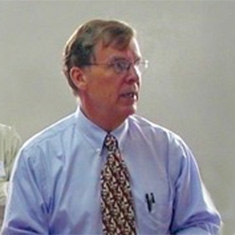Retired surgeon helps people with disabilities in developing nations
Oct. 30, 2019 — As a child growing up in western New York, John R. Fisk ’65 loved using tools to repair and build things, from model airplanes to tree houses and forts.
Fisk made his way through Grinnell College as a biology major and then entered medical school. He was then drawn toward orthopaedic surgery, a specialty “that’s a real opportunity to work with your hands and fix things,” he says.
That’s the simplified answer though.
“Orthopaedic surgeons help a patient with a fracture heal without a deformity, a child with a birth defect improve their function by correcting or modifying that defect, a person with a paralysis from disease or injury improve their level of disability, and an individual with a disability from normal aging regain some lost function,” Fisk says giving his detailed reasons for choosing his profession.
For decades he’s been volunteering his time with different organizations, teaching prosthetic and orthotic skills. He also talks with health care workers in developing nations about the needs of people with disabilities.
 John Fisk ’65
John Fisk ’65
Although retired from practice since 2007, Fisk now serves as chairman of the board of Exceed Worldwide, a U.K.-based charity with schools in Myanmar, the Philippines, Sri Lanka, Indonesia, and Cambodia that train and educate brace and limbmakers and provide free limb care to those living in poverty.
The idea to teach disability care overseas started when Fisk was working with a group that invited him to Guatemala to treat children there. “It quickly become evident that doing ‘parachute surgery,’ where you fly in, take care of a bunch of kids for a week, then leave them without follow-up care, didn’t make sense,” he says. “I realized that a better route would be to educate people in those underserved regions so they do the care, and that continues today – educating people in health care who deal with kids with disabilities.”
The father of six began that work in the early 1990s, when Fisk traveled to Cambodia to teach bracemakers and limbmakers, as well as nurses and physical therapists, about disability care. He’s been to Tanzania, Rwanda, Nigeria, and other countries teaching a nonsurgical casting technique (the Ponseti Technique) to improve clubfoot, which is the number one cause of ambulatory disability globally.
Fisk also was involved in Health Volunteers Overseas, which sends healthcare professionals to schools and hospitals in underserved regions around the world to set up education programs.
Fisk, whose wife Diane is a former orthopaedic nurse, comes from a long line of Grinnellians. His father, Robert S. Fisk ’35, was dean of education at University of Buffalo; and his uncle Wallace K. Fisk ’40, and Wallace’s son, Wally Fisk ’67, also are Grinnell graduates. His mentor during orthopaedic residency was the late Dr. Robert Winter ’54.
John Fisk attended medical school at SUNY Buffalo, completed his orthopedic training at University of Minnesota, and then served two years in the Army Medical Corps in Seoul, Korea.
“In Korea I saw disabled children, mainly effected by polio, who I had the skills to help,” he says. “The paralysis caused by polio is one of the things that orthopaedic surgeons are best suited to work with. It teaches us to evaluate muscle weakness, to do tendon transfers and joint fusions, and guide children toward rehabilitation.”
Fisk went on to serve as a pediatric orthopaedic surgeon at Emory University, Loyola University Chicago, and Southern Illinois University School of Medicine, where he retired as professor and chief of the Division of Pediatric Orthopedic Surgery in 2007. He also served as chief of the Limb Deficiency Clinic at Shriners Hospital for Crippled Children in Chicago. Today he and his wife divide their time between Ontario, Canada, and South Carolina.
In the past, he hosted Grinnell interns at his medical practice, and he still hears from Grinnell students in the sciences, asking about volunteering and his career path.
“I’d like to inspire others to learn more about opportunities,” says Fisk. “Largely what I’ve done involves the medical profession, but there’s the Peace Corps and other groups available to adults and college-age kids. Volunteering and doing good in the world is really about what interests me.”
—by Anne Stein ’84
For your information:
Learn more about how Exceed Worldwide provides prosthetic and orthotic services in Asia.
To read more alumni news, check out our news archive.